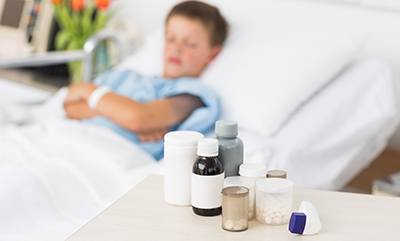Delivery Service Increases ‘Meds in Hand’ for Asthma Patients.
 An initiative that sent families home from the hospital with a supply of children’s asthma medication, delivered to patients’ rooms, was successful in reducing the odds that children would return to the emergency room, a study by researchers from the Schools of Medicine and Public Health and Boston Medical Center shows.
An initiative that sent families home from the hospital with a supply of children’s asthma medication, delivered to patients’ rooms, was successful in reducing the odds that children would return to the emergency room, a study by researchers from the Schools of Medicine and Public Health and Boston Medical Center shows.
The study, co-authored by Howard Cabral, professor of biostatistics at SPH, piloted a project at BMC intended to increase the proportion of patients discharged from an asthma admission with a supply of medications in hand. Pharmacy delivery to patients’ rooms achieved the projected goal of 75 percent of discharged patients going home with medications, with lower-than-average odds of them returning to the emergency department within 30 days.
Of three options for increasing medication use—writing prescriptions before the day of discharge, writing them on the day of discharge and facilitating their pickup from the hospital pharmacy, or delivering them to patients’ rooms—the delivery option was the most effective. The proportion of patients who went home with medications in hand rose from 40 percent to 75 percent among the three groups.
A patient survey in 2011 had found that 37 percent of a sampling of asthma patients at BMC had not filled their prescriptions 48 hours after discharge. That proportion was consistent with the “low prescription filling rate” of asthma patients, the authors said.
“Although more evidence on the impact of being discharged in possession of discharge medications is needed, a service that provides admitted patients with their outpatient medications before they leave the hospital has many potential benefits,” the authors wrote.
They suggested that additional areas of study could include how the “Meds-in-Hand” service affects the patient experience, hospital finances and clinical outcomes for other medical conditions.
Besides Cabral, authors included Jonathan Hatoun, Megan Bair-Merritt, and James Moses, all of the School of Medicine and BMC. Hatoun is an SPH alumnus who is now at Boston Children’s Hospital.
Comments & Discussion
Boston University moderates comments to facilitate an informed, substantive, civil conversation. Abusive, profane, self-promotional, misleading, incoherent or off-topic comments will be rejected. Moderators are staffed during regular business hours (EST) and can only accept comments written in English. Statistics or facts must include a citation or a link to the citation.